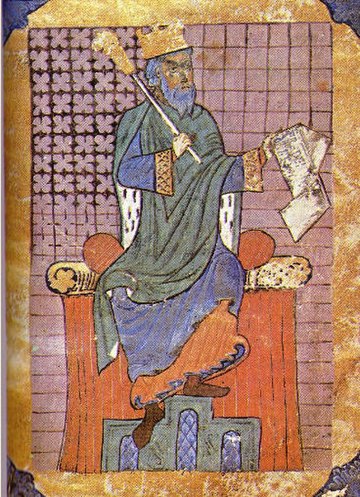Year 1037 (MXXXVII) was a common year starting on Saturday (link will display the full calendar) of the Julian calendar.
This article needs additional citations for verification. (August 2017) |
| Gregorian calendar | 1037 MXXXVII |
| Ab urbe condita | 1790 |
| Armenian calendar | 486 ԹՎ ՆՁԶ |
| Assyrian calendar | 5787 |
| Balinese saka calendar | 958–959 |
| Bengali calendar | 444 |
| Berber calendar | 1987 |
| English Regnal year | N/A |
| Buddhist calendar | 1581 |
| Burmese calendar | 399 |
| Byzantine calendar | 6545–6546 |
| Chinese calendar | 丙子年 (Fire Rat) 3734 or 3527 — to — 丁丑年 (Fire Ox) 3735 or 3528 |
| Coptic calendar | 753–754 |
| Discordian calendar | 2203 |
| Ethiopian calendar | 1029–1030 |
| Hebrew calendar | 4797–4798 |
| Hindu calendars | |
| - Vikram Samvat | 1093–1094 |
| - Shaka Samvat | 958–959 |
| - Kali Yuga | 4137–4138 |
| Holocene calendar | 11037 |
| Igbo calendar | 37–38 |
| Iranian calendar | 415–416 |
| Islamic calendar | 428–429 |
| Japanese calendar | Chōgen 10 / Chōryaku 1 (長暦元年) |
| Javanese calendar | 940–941 |
| Julian calendar | 1037 MXXXVII |
| Korean calendar | 3370 |
| Minguo calendar | 875 before ROC 民前875年 |
| Nanakshahi calendar | −431 |
| Seleucid era | 1348/1349 AG |
| Thai solar calendar | 1579–1580 |
| Tibetan calendar | 阳火鼠年 (male Fire-Rat) 1163 or 782 or 10 — to — 阴火牛年 (female Fire-Ox) 1164 or 783 or 11 |

Events
By place
Europe
- Spring – A revolt in northern Italy is started by Archbishop Aribert of Milan. King Henry III (eldest son of Emperor Conrad II) travels south of the Alps to quell it.
- February – At an Imperial Diet in Pavia (assembled by Conrad II), Aribert is accused of fomenting a revolt against the Holy Roman Empire, Conrad orders his arrest.
- May – Conrad II, with Pavian assistance, lays siege to Milan at the Porta Romana side, but the city holds out. In Rome, Pope Benedict IX deposes Aribert as archbishop.
- May 28 – Conrad II decrees the Constitutio de Feudis which protects the rights of the valvassores (knights and burghers of the cities) in Lombardia (modern Italy).
- Summer – A Byzantine expeditionary force under George Maniakes lands at Sicily, and defeats the Zirids. Maniakes begins his campaign to reconquer the island.
- September 4 – Battle of Tamarón: Ferdinand I defeats and kills his brother-in-law Bermudo III. Ferdinand becomes the king of Castile and León (modern Spain).[1]
- November 15 – Battle of Bar-le-Duc: Odo II, Count of Blois and Champagne, while invading the Duchy of Lorraine dies in battle with forces loyal to Gothelo I.
England
- King Harold I seizes the throne of England from his half-brother Harthacnut. His mother, Emma of Normandy, flees to Bruges in Flanders (modern Belgium).[2]
Asia
- The Chinese rime dictionary of the Jiyun is published during the Song Dynasty.
- The Great Seljuk Empire is established by Tugrul Bey.
Births
- January 8 – Su Dongpo, Chinese calligrapher (d. 1101)
- Beatrice I, German abbess of Quedlinburg (d. 1061)
- Hawise, duchess of Brittany (approximate date)
Deaths
- September 4 – Bermudo III (or Vermudo), king of León
- November 15 – Odo II, French nobleman (b. 983)
- Abu'l-Hasan Mihyar al-Daylami, Persian poet
- Abu Mansur al-Baghdadi, Persian Shafi'i scholar
- Baba Kuhi of Shiraz, Persian Sufi mystic (b. 948)
- Avicenna, Persian physician and polymath (b. 980)
- Boleslaus III (the Red), duke of Bohemia
- Ding Wei, grand chancellor of the Song Dynasty
- Farrukhi Sistani, Persian poet (or 1038)
- John of Debar, Bulgarian clergyman and bishop
- Muhammad al-Baghdadi, Persian mathematician
- Muirgeas ua Cú Ceanainn, king of Uí Díarmata
- Robert II, French prelate and archbishop
- Siegfried II, German nobleman (b. 956)
- William III (Taillefer), French nobleman
References
Wikiwand in your browser!
Seamless Wikipedia browsing. On steroids.
Every time you click a link to Wikipedia, Wiktionary or Wikiquote in your browser's search results, it will show the modern Wikiwand interface.
Wikiwand extension is a five stars, simple, with minimum permission required to keep your browsing private, safe and transparent.
